ٱلْحَمْدُ لِلَّهِ رَبِّ ٱلْعَـٰلَمِينَ
[Quran 1:2]
Alḥamdu liLlāhi Robbi al’Ālamína
[The] commends are God’s – Master of [the] World[s],
TO SUMMARISE:
• The Arabic fatḥaħ/Àlif can be used to represent two vowel sounds – light ‘a’ or heavy ‘o’ – depending on the consonant before it.
• The Grand Name – ‘Allah’ – is exceptionally pronounced with the second vowel heavy – as ‘Allōh‘ – despite Lám not being a heavy consonant.
• ‘Allah’ is still pronounced with light ‘a’ vowels when begun by the kasroħ ‘i’ sound.
In our honest efforts to learn the recitation of the Noble Quran, one can often neglect taking time to master the basics of the ancient language – allowing mispronunciations to set into habit. In this article, we look at the truly unique rules associated with pronouncing the Grandest of names – الله ‘Allah‘ – which non-Arab muslims without a formal training, and even many among those who do have, surprisingly find themselves misrepresenting.

Arabic Vowels
Before understanding the nuances of the word ‘Allah’, let us first recap the system of Arabic vowels and their association with ‘heavy’ and ‘light’ letters.
There is plenty for English-speakers to struggle with when learning to speak Arabic, but vowels need not be one of them. Vowels are sounded by gently exhaling while vibrating the vocal tract; they are then distinguished by the shape of the lips during this process. The Arabic vowels ‘a‘, ‘u‘, and ‘i‘ can be expressed in writing with [harokát] diacritics, and letters ا Àlif, و Wau, and ي Yá respectively.
SOUNDING THE THREE MAIN ARABIC VOWELS:
• ‘a‘ – as in ‘bat’ – represented by a [fatḥah] diacritic above the letter, and elongated with an Àlif
• ‘u‘ – not found in English, between that of ‘look’ and ‘lock’ – represented by a [ḍommah] diacritic above the letter, and extended with a Wáu. Occasionally represented with ‘o’ instead
• ‘i‘ – as in ‘meet’ – represented by a [kasroh] diacritic below the letter, and extended with a yá. Occasionally represented with an ‘e’ instead
Now we turn to the confusion. Though Arabic vowels are commonly taught as being three, there are more precisely four, as the Arabic fatḥaħ/Àlif is actually used to represent two vowel sounds. To understand this, read out for example, the words ‘bat‘ and ‘ball‘. Notice how their vowels sound different, despite being spelled with the same letter? English spelling is notorious mind, and we could have more intuitively written ‘boll‘ instead of ‘ball’. However, this example helps us understand more about the Arabic fatḥaħ/Àlif, which is also used to represent two vowel sounds.
In English, these two sounds are conventionally referred to as ‘light’ ‘a’, and ‘heavy’ ‘a’. The reason why these two sounds are usually not distinguished in Arabic education however, is because the sound is technically attached to the consonant letter before it. It is actually the consonants that are categorised as either مُفَخَّم [mufaccom] ‘heavy‘ (giving the following fatḥaħ/Àlif the ‘o’ sound ), or مُرَقَّق ‘muroqqoq‘ ‘light‘ (giving the following fatḥaħ/Àlif the ‘a’ sound).1 Thus, you may have noticed by now that the transliteration of both sounds are being distinguished in this article using the letter ‘a’ for light or the letter ‘o’ for heavy.
So what are these heavy Arabic consonants that invoke the differing ‘o’ sound? Take note of the list below if you are unsure –
[MUFACCOM] ‘HEAVY’ LETTERS:
•خ Cóf
•ص Ṣód
•ض Ḍód
•ط Ṭo
•ظ Ṿo
• غ Goin
•ق Qóf
Please note, ر Ró is a special case that is only heavy when it is followed by a fatḥaħ or ḍommaħ.
The uniqueness of ‘Allah’
The second ‘a’ in ‘Allah’ (which is extended – and is represented here in the English with a macron) should be pronounced with a heavy ‘o’ by default, and is better spelled as ‘Allōh‘. Please note however, this ‘o’ is actually like the ‘u’ sound in ‘luck’ rather than the ‘o’ sound in lock, but the difference is very slight, and it is being transliterated as ‘o’ to avoid confusion with the usage of ‘u’ to represent the sound made from ḍommah/wáu.2 So for example:
قُلْ هُوَ ٱللَّهُ أَحَدٌ
[Quran 112:1]
Qul Huwa Alllōhu àḥadun
Say, “He is the only God.
The word for ‘God’ in Surah Iklaas should be pronounced ‘Allōh‘ with a heavy vowel (not ‘Allāh’).
Now you might have realised that ل Lám, despite preceding the second heavy ‘o’ in ‘Allōh‘, is not amongst the list of heavy Arabic consonants. This is what makes the word easy to mispronounce for the unacquainted reciter; it should indeed be pronounced with a heavy ‘o’ sound.
Finally, if things were not complicated enough, one should also remember the important exception to this practice – if the first Àlif [waṣl] in ‘Allah’ is preceded or replaced by the kasroħ ‘i’ vowel, then the second Àlif in ‘Allah’ becomes light again, and should be pronounced ‘a’. The two most famous examples of this exception in the Quran are in the first Ayah of Surah Fatiha, as introduced at the beginning of this article, and the Basmala itself, where the first two words should be pronounced ‘Bismi Llāh‘ (not ‘Bismi Llōh‘).
TO SUMMARISE:
• The Arabic fatḥaħ/Àlif can be used to represent two vowel sounds – light ‘a’ or heavy ‘o’ – depending on the consonant before it.
• The Grand Name – ‘Allah’ – is exceptionally pronounced with the second vowel heavy – as ‘Allōh‘ – despite Lám not being a heavy consonant.
• ‘Allah’ is still pronounced with light ‘a’ vowels when begun by the kasroħ ‘i’ sound.
Allōh knows best.
Last updated:
- Gerald Drißner [June 16, 2018], How do you pronounce Allah correctly?.
↩︎ - Arabic 101 [May 17, 2020], How to PROPERLY pronounce the word (Allah) in the Holy Quran – Arabic 101.
↩︎
Jazak-Allah for reading. All knowledge, opinions, and translations expressed in our articles are the earnest study and reflections of the writer, prioritising honest interpretations of the Quran and authentic Hadith as evidence. Though the information contained does not necessarily represent the views of anyone other than the writer, all articles are cross-checked by brothers and sisters knowledgeable and experienced on the topic before being published on our site. We ask for forgiveness for presenting any information that comes to be incorrect or misleading, and accept that Allah is the Most-Knowing One.


